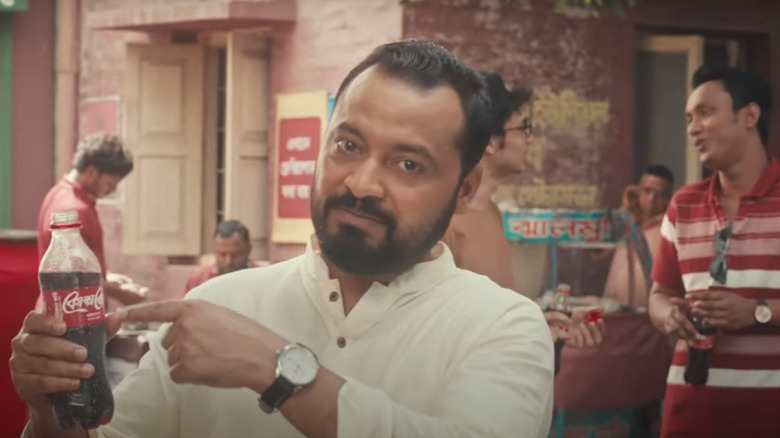The Coca-Cola Commercial You'll Likely Never See Thanks To Huge Backlash
Coca-Cola advertising has a history of making an impression. An early Coca-Cola sign can fetch an eye-popping prize on "American Pickers," and stars like Keanu Reeves have appeared in the brand's commercials early in their career. However, not every Coca-Cola ad is a slam dunk — and one of them was so badly received that you're unlikely to ever see it on Coke's official channels again.
The brand has been on hot water in Bangladesh after running an ad that tells consumers that Coca-Cola doesn't come from Israel. The Bengali-language commercial, which ran on Sunday, June 9, appeared to distance the brand from Israel due to the ongoing Israel-Gaza war. In it, a customer tells a shopkeeper that he doesn't want Coca-Cola anymore because of the drink coming from an unnamed country, which prompts the latter to seek out the dodgy source of this information. Then, he quite literally hits the streets to inform everyone he can find about the drink's long and international history, which is unconnected to the aforementioned nameless country. While Israel isn't mentioned by name, the ad does note that Palestine has a Coca-Cola factory.
The message didn't go over well among the public. Instead, it sparked huge outrage, and Coca-Cola ended up pulling the commercial.
The ad angered boycotters even more
Coca-Cola's advertisement backlash comes at a time when the company is seeing its sales falling due to a consumer boycott in the area. While the commercial's intention seems to have been to boost sales in Bangladesh, marketing expert Omar Nasif Abdullah of Bangladesh's North-South University has noted that its failure to read the room is likely to have the exact opposite effect. "The new PR campaign is laden with the wrong message and wrong approach," he told Al Jazeera. "And in the cut-throat world of marketing, that's an unforgivable mistake."
The people's anger at the campaign has been such that the ad's star and director, Saraf Ahmed Jibon, has also made a public apology. "I simply presented the information and data provided by their agency," he wrote on Facebook (via Al Jazeera). "This project was only a part of my professional work ... I have not supported Israel in any way, and I never will." Because of all this, it doesn't seem likely that the ad campaign will make a comeback any time soon — and it may have landed itself a position among the most controversial TV commercials of all time.

